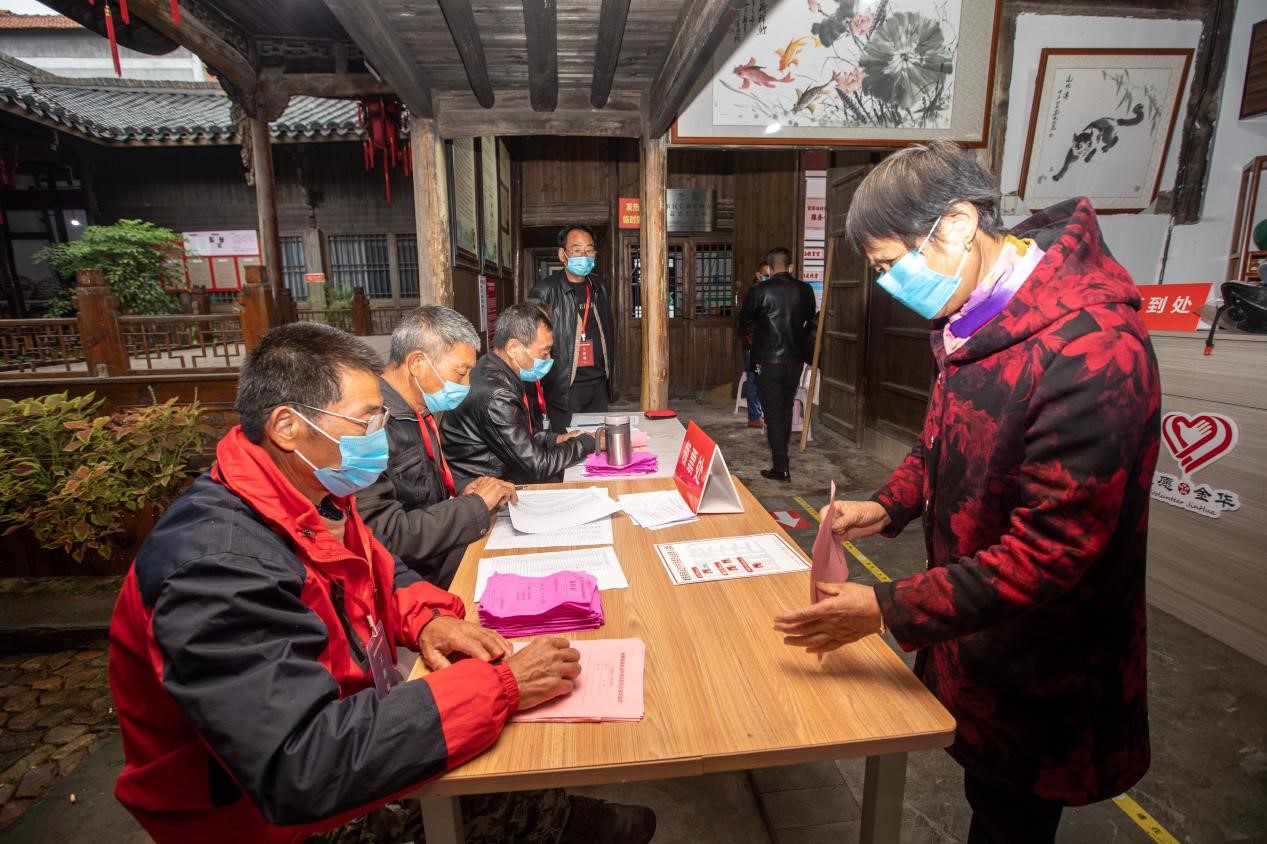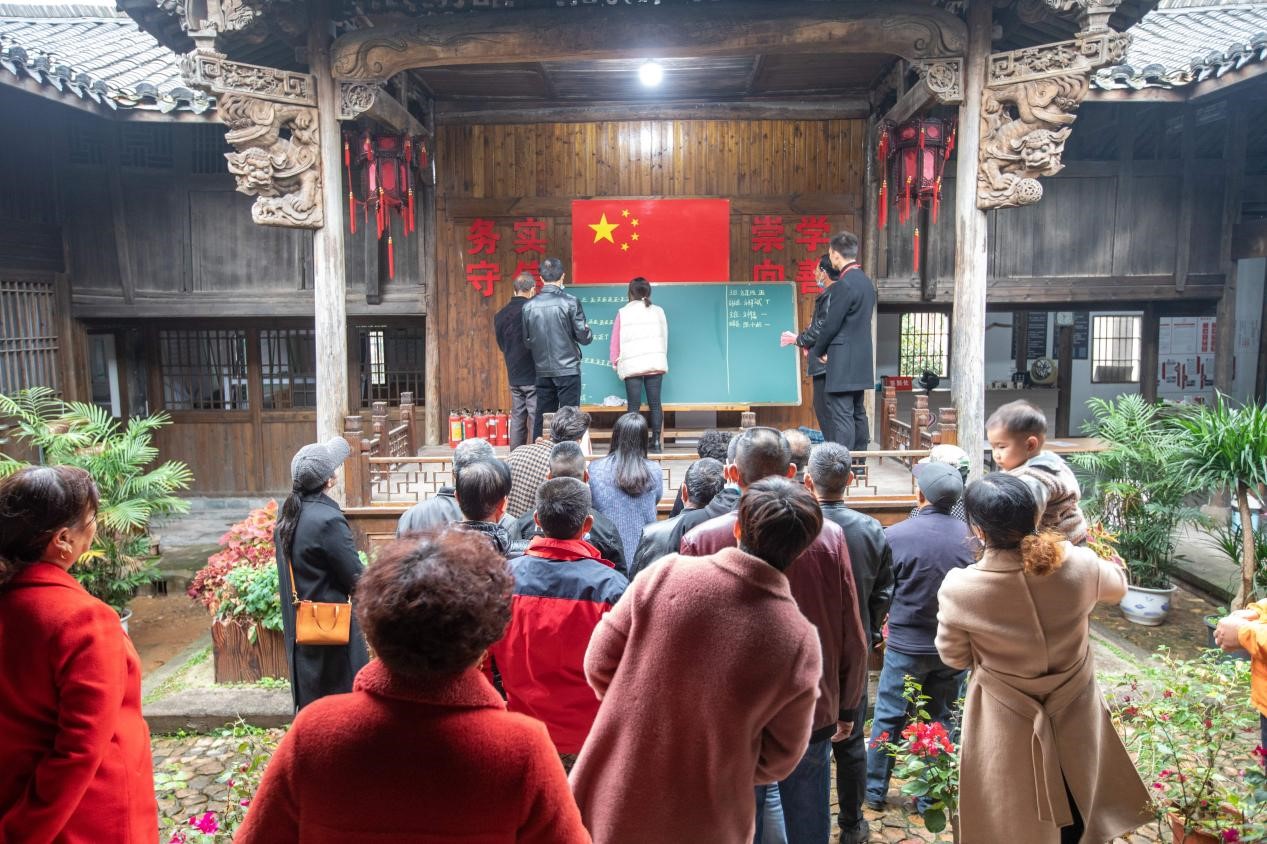China’s democracy is translated into concrete and pragmatic practices
During the drafting of the proposals for the 14th Five-Year Plan (2021-2025) for National Economic and Social Development and the Long-Range Objectives Through the Year 2035, the Communist Party of China (CPC) solicited public advice and suggestions online about the formulation of the proposals for the first time in the history of the country’s Five-Year Plan.

Residents in Qianxibian village, Tangya township, Jindong district, Jinhua city, east China’s Zhejiang province, count votes in an election for officials for the villagers’ committee, Nov. 26, 2020. (People’s Daily Online/Yang Meiqing)
Among more than one million pieces of advice and suggestions made online, the advice of “mutual-aid elderly care” from a netizen with the username “Yun Fan” was included in the proposals for the 14th Five-Year Plan (2021-2025) for National Economic and Social Development and the Long-Range Objectives Through the Year 2035, and eventually became a concrete measure in the document.
The story serves as a vivid demonstration of the fact that China’s democracy is translated into concrete and pragmatic practices.
“Whole-process people’s democracy in China is a complete system with supporting mechanisms and procedures, and has been fully tested through wide participation,” said a white paper titled “China: Democracy That Works” issued by the country’s State Council Information Office.
Thoroughly expounding the practice of the whole-process people’s democracy in China, the document pointed out that the whole-process people’s democracy is a comprehensive and coordinated system involving extensive and regular participation.
Whole-process people’s democracy operates a democratic system covering a population of more than 1.4 billion from 56 ethnic groups of a vast country, making possible the wide and sustained participation of all the people in the country, according to the white paper.
Whether the people enjoy democratic rights depends on whether they have the right to vote in elections and whether they have the right to continuously participate in political affairs in their everyday life.

Residents in Qianxibian village, Tangya township, Jindong district, Jinhua city, east China’s Zhejiang province, cast their ballots to elect officials for the villagers’ committee, Nov. 26, 2020. (People’s Daily Online/Yang Meiqing)
In China’s practice of democracy, the country lays emphasis on both the role of electoral democracy and the advantages of consultative democracy, ensuring that people exercise their right to vote in elections and participate in state and social affairs through extensive consultations.
Integrating electoral democracy and consultative democracy, the whole-process people’s democracy in China consolidates the people’s principal position in the country’s political and social life and leaves no room for politicians to shower promises while campaigning and break them all once elected.
Whether the people enjoy democratic rights depends on whether they have the rights to take part in democratic elections, decision-making, management, and oversight.
By exercising their right to vote in elections, the Chinese people elect those who represent their will to hold and exercise power. At the same time, they undertake extensive deliberations before major decisions are made.
In China, hearing people’s voices, acting on their needs, and pooling their ideas and strength have become a standard practice. More and more ideas and suggestions of the general public are flowing directly to decision-makers at all levels, and they are increasingly reflected in the major decisions of the Party and the government.
The Chinese people are the masters of the country and exercise their democratic rights accordingly, managing affairs of the state, the economy, culture, and society through various channels and in many forms.
Taking into consideration its own conditions, China has explored a coordinated system of oversight and established a well-defined, efficient supervisory network with clear functions and responsibilities. Supervision of power extends across every area and into every corner.

Residents in Qianxibian village, Tangya township, Jindong district, Jinhua city, east China’s Zhejiang province, cast their ballots to elect officials for the villagers’ committee, Nov. 26, 2020. (People’s Daily Online/Yang Meiqing)
The wider the people’s democratic participation is, the better people’s aspirations can be expressed and the principle of the people running the country as its masters be realized.
Since the launch of the reform and opening-up in 1978, China has held 12 direct elections to people’s congresses at the township level and 11 direct elections to those at the county level, with a current participation rate of about 90 percent.
Among the enterprises in China that have established trade unions, a total of 3.14 million have established employees congresses.
Before adopting the Civil Code, the country solicited public opinions on the draft of it for 10 times and received more than one million pieces of suggestions and comments.
Today, as China constantly improves its democratic system, diversifies the forms of democracy, and expands democratic channels, the principle of the people being masters of the country is manifested in the Party’s governance policies and measures, in all aspects of the work of the Party and state organs at all levels, and in the efforts to meet the people’s expectation for a better life in a concrete and realistic way.
Photos
Related Stories
- Commentary: West-led small circles blind to democratic progress in Hong Kong
- Chinese rap song goes viral, critiques 'American-style democracy'
- Hong Kong's democratic progress not to be halted by few countries' smearing: liaison office of central gov't in HKSAR
- No distortion or slander can stop Hong Kong's democratic progress: Chinese spokesperson
- Official explains white paper on Hong Kong's democracy
- Democracy not a one-size-fits-all product: Chinese envoy
- China contributes to stability, democratization of int'l order: Cambodian scholars
Copyright © 2021 People's Daily Online. All Rights Reserved.










